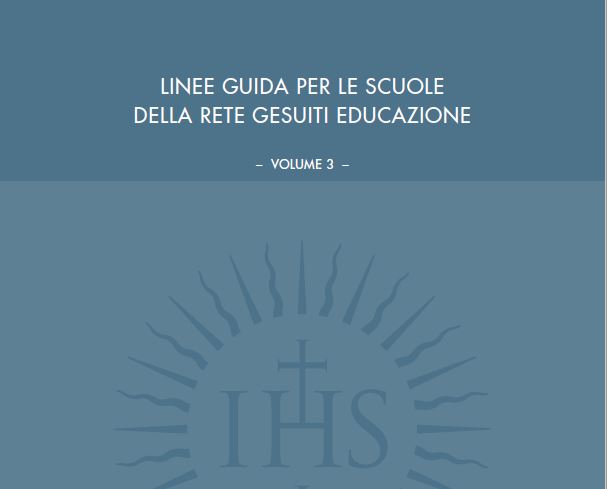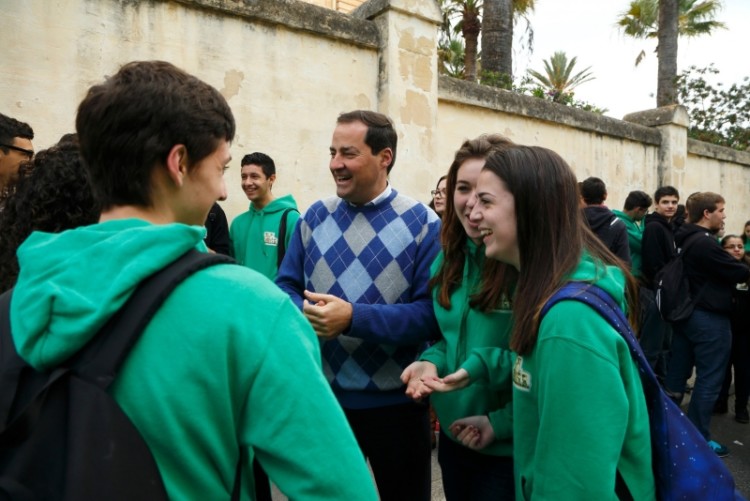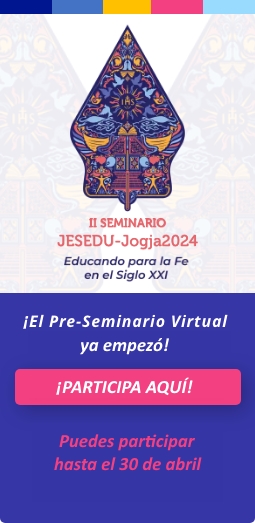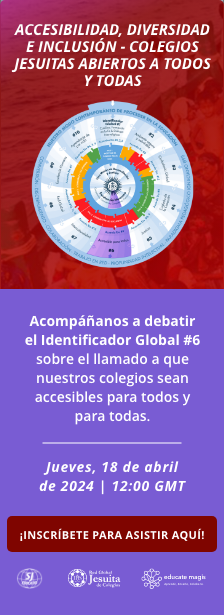The third volume of the Guidelines for schools of the Jesuit Education Foundation of the Euro Mediterranean Province has been published. It is an important document that integrates, updates and implements the two previous volumes, published in 2017. This third volume reflects the work carried out in the last three years by the Jesuit Education Foundation and by all the schools of the network. It carries on and continues to build on the work started by the previous Board of Directors of the Foundation, which had outlined, with the first two volumes, the direction and the identity of our educational mission for our schools in Albania, Italy and Malta, within the global vision of the global educational mission of the entire Society of Jesus.
The publication in 2017 of the first two volumes of the Guidelines had certainly marked a fundamental step in the process of building the network of schools in the EUM Province: strong common vision, a robust common approach around which to strengthen the Ignatian identity of our schools.
The continuous work of accompanying the schools of the Jesuit Education Foundation has often highlighted in recent years the need to complete – and in some cases to revise – the Volumes 1 and 2. It was also the origin of the idea of creating a Volume 3, with both some additions, complements and some revisions. A volume that confirms, enriches, and updates the ones of 2017. The great changes in the context of our Province and of the whole world and the important documents of the Society of Jesus in recent years have then made urgent the need to collect in a new volume all the documents of this period, right at the beginning of the Ignatian Year.
This third volume is divided into two parts. The first part is dedicated to the updating and completion of Volumes 1 and 2, through, among other things, the revision of the chapter on one of the «red threads» of the Curriculum, Internationality (which, in the meantime, has taken on a much broader meaning, profound and important, transforming itself into “Global Citizenship Education”). The second part, on the other hand, concerns both new issues not present in previous volumes (i.e. human resources, communication, fundraising and sport) and an update of the identity of our schools in the light of the new, very important and founding documents of the Society of Jesus.

Among these documents, fundamental for the identity of the Ignatian educational mission, are the JESEDU Action Statement of Rio de Janeiro 2017, the document «The Jesuit Schools: A Living Tradition in the 21st Century – A Permanent Exercise of Discernment», the important letter from Fr. General dated 9 July 2020 entitled «Jesuit Schools and Companion Schools – Companions in Mission», considerations on Affiliate, Partner, Sponsored, Companion, Associate Schools – Ignatian Schools / Jesuit Schools ”.
Fr Jimmy Bartolo SJ, President of the Jesuit Education Foundation, writes in the preface to the volume: «We must certainly also carefully consider the ten indicators, mentioned in» Jesuit Schools: A Living Tradition in the 21st Century – A Permanent Exercise of Discernment « , and work hard to ensure that all indicators are implemented in our educational institutions, as we want our schools to be truly recognized as Jesuit Schools and Companion Schools. Furthermore, the Society of Jesus communicated the four universal apostolic preferences for the Jesuit mission for the next ten years. These documents require reflection, discussion, assimilation and, above all, implementation «.

This third volume of the guidelines is an additional step in a logic of constant improvement, adaptation, and growth in the apostolic service for our students and their families. At the centre of our work there are always our students, as people, no matter their age (from kids to late teenagers). Although they are not the «direct» recipients of this volume, they are still the real focus, the centre, the essential and ultimate goal of our mission. In Ignatian pedagogy, the student is always at the centre of any activity, he is the only true protagonist of his own education and growth, accompanied by the many figures who work at different levels in our schools. These guidelines help us to better accompany our children with an Ignatian style.
«We are going to face a period – writes Guido Bigotto, Director of the Jesuit Education Foundation – that will certainly be extremely complex and that will call us to redesign our world, both inside and outside our schools. The awareness of being part of a common network and of having the Society of Jesus at our side to accompany us in the deep challenges that we will face, give us even more strength and determination in trying to carry out the will of the Lord in our schools».

The Jesuit Education network is very developed, rich, and diversified: it includes schools in Italy, Albania and Malta. It also includes sports centers, as well as CeFAEGI and the Fe y Alegría Italia network. The three Countries follow different study programs and are governed by different local rules. Even within Italy itself there are many differences. However, the meaning of the network is precisely to call everyone to work together and support each other, at different levels and in collaboration with the other entities of the EUM Province, and of the entire Society of Jesus.
“This volume – continues Fr. Bartolo – also tells us how important it is to work together as a network. I would like to personally thank all those who have concretely contributed, with hard and intense work, to the realization of this volume, as well as all our schools and all those who work there. We are simply indebted to all our educators for their competence and service. It is for them, who are constantly in contact with the students, that we offer our educational model. We thank the Lord for the gift of all these friends and companions in the educational mission, and, above all, for all the good that is done through the educational apostolate in our Province «.
Inicia sesión o Hazte miembro
para crear y ver comentarios

